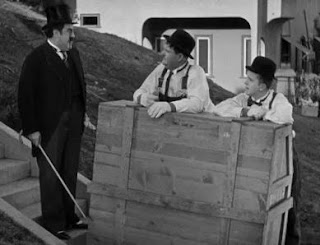HMRC - Why The Private Sector Couldn't Do It Better
No-one likes sitting listening to recorded music over the phone, so I felt sorry for the bloke the other day who was saying he'd been held in an HM Revenue and Customs phone queue for over an hour. But then he said, "They're probably all sat there eating doughnuts instead of picking up the phone. They ought to privatise it!" There's an answer about the doughnuts*. But first of all, there's the idea that the private sector could run HMRC's functions better. Here's my top five reasons why it couldn't.
5 - It's been tried before. From 1992 to 1994, the Government set up a 'Market Testing' programme, to measure Civil Service efficiency against the private sector. Customs and Excise completed 40 market tests in one year, with 90% of the in-house bids successful. In other Government departments over 12,000 jobs were cut from the state payroll by being TUPE'd out to private contractors. But the National Audit Office pointed out to MP's that it had no right to audit private sector companies, and therefore had no way of telling if the state was getting good value for money from 'contracting out.' The market testing scheme was quietly shelved in 1994.
4 - The private sector has to make a profit. So, not only does the private sector have to do things more efficiently, they also have to build in a profit margin. Plenty of traders complain about being "unpaid tax collectors for the VAT Man". How would they feel about being "unpaid tax collectors" and knowing that the VAT Man was taking a slice for himself? But wait. Some firms don't want to make a profit. Something to do with tax. So maybe if they were just a bit more efficient than the public sector, but not so efficient that they ever made a profit. Would you be happy with that? Or, on the other hand, if something unexpected (like a Pandemic, say) meant that they made such a big loss that they had to hand back the keys like a train company. Would that be OK?
3 - Private industry isn't always as efficient as it thinks. I remember visiting one firm to look at their Cream Tea Duty returns. The financial director proudly told me that their stocks of clotted cream were measured by the latest ultrasonic gauges. But when I got down on the shop floor the production workers told me that the gauges had broken down months ago and all the measurements were taken with a wooden dipstick ("Old Mabel" as they called it). Another company insisted the losses of jam in their records were down to spreadsheet rounding errors. But out in the yard, the jam feeder pipe was encrusted in a solid lava flow of old jam which had been oozing out of a crack. The production manager told me he was waiting for authorisation to fix the pipe, and anyway, "they're not actually losses because you can still see the jam." One bloke just lost it when I asked him to explain a shortage of scones moved out of the bonded store. "This is the Patisserie Industry," he told me sarcastically, "As long as we get all the Cream Teas we expect at the end of the day, we don't worry about what goes into them." Yes, this is what they call in the trade, "anecdotal evidence", but so is the guy who's been stuck in the phone queue for over an hour.
2 - HMRC has been trying to behave like the private sector for years. That's why they bought into 'Lean' where everybody spent half an hour each morning worshiping the White Board like some South Seas cargo cult. That's why they've been automating and shrinking every process they can and employing expensive subcontractors and agency staff (some of whom used to work directly for HMRC). Think of all the minor irritations that are built into any large private sector organisation and you'll probably find them in HMRC. If they're really lucky, HMRC staff even get to go on training courses where someone gets paid £500 an hour to tell them, "there's no such thing as problems, only opportunities."
1 - This is not said enough. HMRC is a diverse organisation. It does a lot of different things and does most of them well. When the pandemic and lockdown first hit last year, Customs staff quickly issued border clearances for medical supplies, Excise and International Trade staff ensured companies had the correct licenses to produce hand sanitiser, and once it was sanctioned, HMRC rapidly initiated the furlough schemes. The things that go wrong hit the headlines or social media. The things that go right get buried in the Annual Report.
*Doughnuts - As for the idea that everyone on the helpline is sitting around eating doughnuts, the question holds the key to the answer. No-one likes to think of Civil Servants sitting around doing nothing. So, a helpline is only given enough staff to deal with predicted numbers of calls. And sometimes the predictions go wrong. Who knows why everyone in the country suddenly decides to call an HMRC helpline at the same time. Maybe it's a rainy day. Maybe they've all been watching "Doctors", turn off the TV and think, "What shall I do now? I know, I'll ring HMRC." If they were emails, you'd think it was some kind of co-ordinated cyber attack. But, no, it's just people who've all decided to ring at the same unexpected time." If you could find the answer to that, you really would make your fortune.




